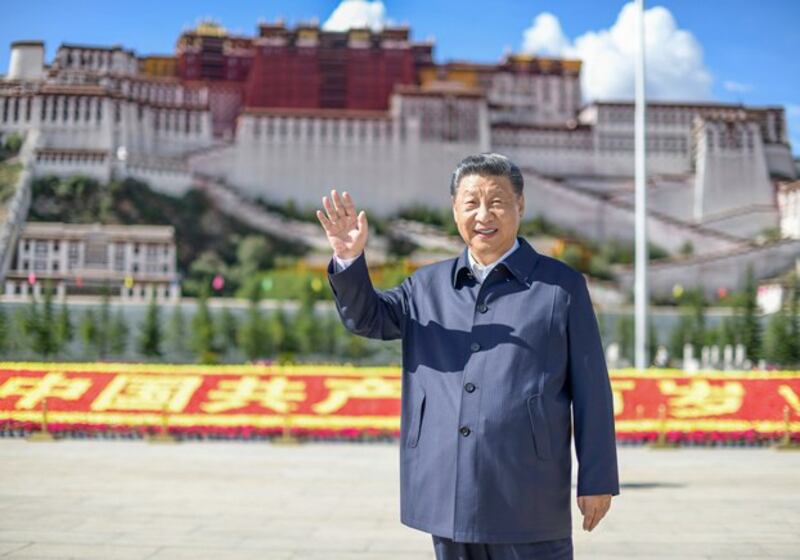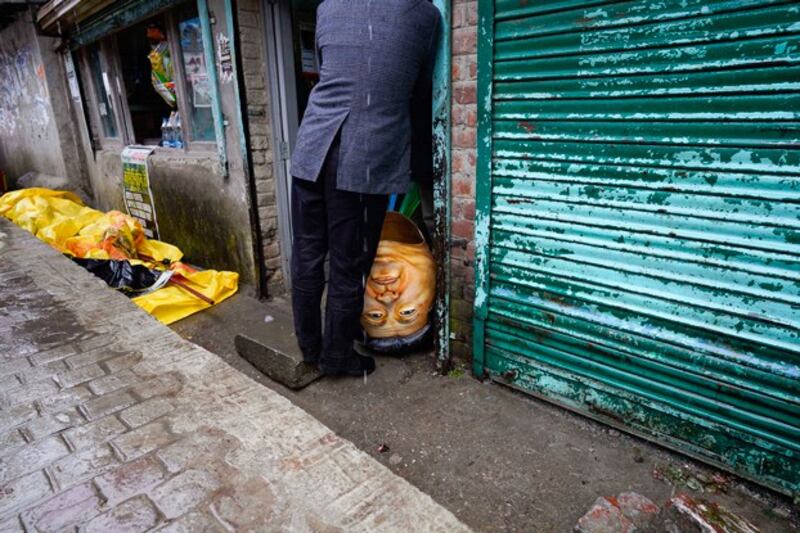Chinese President Xi Jinping this week visited Tibetan-populated areas of western China, where he called for national unity, state media reported, asking Tibetans there to help promote religious, social and ethnic harmony and advance China’s modernization.
Xi visited Golog Middle School — a boarding school for young Tibetans — and the Tibetan Buddhist Hongjue Temple in Xining, capital of Qinghai province, on Tuesday.
But Tibet watchers said his trip only reinforced China’s efforts to Sinicize Tibetan identity, culture and language, and did nothing to help Tibetans.
Xi’s visit to a Tibetan school and monastery appeared to be “a deceptive display aimed at misleading the world,” given ongoing international concern over human rights in Tibet, said Sangay Kyap, a Tibetan rights analyst.
RELATED STORIES
[ Calls grow for proof of whereabouts of Tibet’s missing Panchen LamaOpens in new window ]
[ The story of one of Buddhism’s most revered figures, long missing, explainedOpens in new window ]
[ China pays Tibetans to receive blessings from Beijing-backed Panchen LamaOpens in new window ]
[ China backed Panchen Lama tours TibetOpens in new window ]
Xi has visited Tibet three times since he became leader of the Chinese Communist Party, and the Beijing-appointed Panchen Lama has made multiple visits, said Dawa Tsering, director of the Tibetan Policy Institute in Dharamsala.
“However, these visits consistently place Tibetans under intense scrutiny and severe restrictions, subjecting them to various forms of interrogation,” he said. “It does not help the Tibetans and is just a routine by these leaders.”
Tibetans in Xinjing were alarmed when authorities abruptly closed all streets on June 17-19 and blocked off and cleared a parking lot the next day, said a Tibetan from Tibet, who like others in this report spoke on condition of anonymity out of fear of reprisals.
“We only learned about Xi Jinping’s visit to Xining city through the news,” he said.
Authorities also told the Red Cross Hospital to keep its windows closed during Xi’s visit, and forbade food delivery orders in the city, another Tibetan from Tibet said.
US lawmakers visit Dalai Lama
Xi's visit occurred as a delegation of U.S. lawmakers, critical of China's repression in Tibetan areas, visited the Dalai Lama in Dharamsala, India on Wednesday.
They told the exiled spiritual leader of Tibetan Buddhism that the recent passage of a new policy bill on Tibet was a significant step toward ensuring the self-determination of the Tibetan people.

The lawmakers also pledged to resist China’s interference in his succession and urged Beijing to engage in dialogue with him.
China, which annexed Tibet in 1951, says only Beijing can select the Dalai Lama, as stated in Chinese law, but Tibetans believe that their spiritual leaders are determined by reincarnation.
While in Xining, Xi inspected local efforts to enhance education for a strong Tibetan community, emphasizing patriotism.
Since 2020, the Chinese government has increased its control over language rights in Tibet by shutting down private Tibetan schools and forcing students to attend government-run boarding schools to culturally, religiously and linguistically assimilate them.
Golok Middle School, established in 2017 and financially supported by Shanghai city, operates as what some activists and U.S. lawmakers call “colonial-style” boarding schools, where Tibetan children are separated from their families and taught a Chinese-language curriculum.
Since September 2019, the school has enrolled students mainly from six counties in the province’s Golog Tibetan Autonomous Prefecture and currently has about 800 students.
Two Panchen Lamas
The Hongjue Temple, where Xi also stopped, has long been a vital channel for communication and engagement between China’s central government and Tibetan Buddhist leaders.
It was the site of a December 1951 meeting between Xi’s father, Xi Zhongxun, then the Chinese Communist Party’s deputy secretary of the Northwest Bureau, and the 10th Panchen Lama — whose spiritual authority is second to that of the Dalai Lama.
The elder Xi wanted the Panchen Lama at that time, Erdeni Chokyi Gyaltsen, to return to Tibet from Qinghai province as part of a treaty signed by Beijing and Tibet that year to establish him up as a rival to the Dalai Lama. He agreed to go.

In 1995, China appointed its own chosen Panchen Lama to replace a candidate selected as a young boy by the exiled Dalai Lama, and who vanished into Chinese custody together with his family and has not been heard from since.
The Chinese-appointed Panchen Lama, named Gyaltsen Norbu, also traveled to several Tibetan-populated areas in Qinghai province. Restrictions were pervasive during Norbu’s visit, according to three sources from Tibet.
In Rebgong and Malho counties, military vehicles were stationed on streets for security purposes. People were not permitted to move freely and were randomly interrogated, they said.
Police and plainclothes individuals checked identity cards when Norbu visited Lakha Monastery on June 18 to give a religious teaching, one Tibetan from Tibet told RFA.
When Norbu traveled to Sok county, the Chinese government organized a welcome party of lay people riding horses and carrying red flags.
A video of Norbu’s visit to Machu county was posted online and drew comments from the Chinese.
One read: “Gyaltsen Norbu is a pro-national lama, and we should all support him.” Another said, “All dissidents who do not believe in Gyaltsen Norbu should be expelled from the country.”
Additional reporting and translation by Tenzin Dickyi. Edited by Roseanne Gerin and Malcolm Foster.
